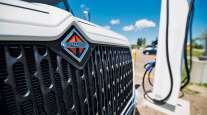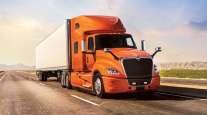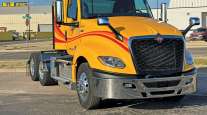Navistar’s Clarke Urges Open Minds, Preparedness as a Potentially Tumultuous Future Approaches

NASHVILLE, Tenn. — The business world could evolve in an orderly, incremental fashion over the next dozen or so years, or it could bound off unexpectedly in a way that startles and flummoxes most people.
Navistar International Corp. Chairman and CEO Troy Clarke said here that he has a sneaking feeling it will be the latter option, and he urged a group of fleet maintenance directors to prepare for that possibility.
“How do we claim a piece of the future, no matter what it is? I think the changes we see are not going to be small and incremental,” Clarke said in a March 1 speech to the Technology & Maintenance Council of American Trucking Associations.
Navistar’s CEO since 2013, Clarke said he sees several freight transportation trends converging in North America and Europe and that companies that can master those changes should do better than those that don’t.
More people are moving to cities or large metropolitan areas and insist upon a certain level of clean air, he said. Therefore, he anticipates the growth of heavily populated low or zero-emission zones that will need a lot of goods.
Related to population growth, Clarke said in his 28-minute speech, highway congestion will continue to increase, wasting ever-larger chunks of people’s time. He cited some congestion figures from ATA.
A third important trend is the expectation that electricity will remain plentiful with a stable price that might even dip a little. Combining these three thoughts, Clarke said it is quite possible that electric trucks will play a much bigger role in U.S. transportation.
“Are we rapidly reaching an inflection point for electric trucks?” Clarke asked.
By 2030, he said, we could see highly automated and efficient diesel-powered trucks making linehaul moves among major regional hubs. After freight is offloaded at a hub, it would be transferred to smaller hybrid-electric or pure electric trucks for final delivery.
Much of this will be helped, he said, by expected improvements in lithium-ion batteries.
Clarke warned about the dangers of entrenched success, saying it leads to protectiveness of the status quo and resistance to necessary change. Once there were great manufacturers of wind-powered cargo ships, steam engines and horse-drawn buggies, and what were the names of these great companies, he asked.
“Nobody knows and nobody cares,” he said.
While mainly looking forward to 2030, Clarke also looked back to 2004, noting the powerful force of disruption the world has seen.
Some of the most important names then were BlackBerry, Motorola, Nokia and Ericsson. In contrast, he said, some firms that were not well-known or performing a different service then were Google, YouTube, Netflix and Facebook.




